P&H HC grants bail to 85-yr-old woman accused of passing casteist remarks as prima facie ingredients of Sec.3(1) of SC/ST Act were not made out

Read Order: Aisha v. State of Haryana
Monika Rahar
Chandigarh, January 19, 2022: The Punjab and Haryana High Court has granted relief of anticipatory bail to the petitioner who was accused of slurring/ passing casteist remarks against the member of a Scheduled Cast on the ground that the petitioner had no knowledge of the fact that the complainant belonged to the Scheduled Cast and as such no specific word or allegation regarding the same was attributed to the petitioner in the FIR.
The Bench of Justice Vikas Bahl after considering the legal position on the subject, said that the bar under Sections 18 and 18-A of the SC/ST Act, was not attracted as, prima facie, the ingredients of Section 3(1) of the SC/ST Act were not made out.
The petitioner approached the Court for grant of anticipatory bail in an FIR registered against 12 persons under Sections 379, 506, 120-B of the Indian Penal Code, 1860 and Sections 3/33/89 of the Scheduled Castes and Scheduled Tribes (Prevention of Atrocities) Act. There was a property dispute between the complainant and the accused which led to constant fights between them. When the complainant saw the petitioner cutting/ stealing crops from his field, the petitioner and the other accused persons in unison, slurred/passed casteist remarks against the complainant. Hence, a complaint was made which resulted in this FIR.
The petitioner’s counsel submitted that the complaint was made after a delay of 10 days from the alleged incident while the FIR was lodged after the lapse of 42 days. He argued that the FIR was just a counterblast to the civil litigation which was pending between the petitioner’s husband and the complainant. It was further his case that the offence under Section 3 of the SC/ST Act was not made out as no specific words were attributed to the petitioner and that it was highly unlikely that all the accused persons uttered the same word in unison. He also argued that the petitioner did not have knowledge of the fact that the petitioner belonged to a Scheduled Caste. Lastly, it was contended that even the eyewitness did not point to the petitioner’s involvement and that anticipatory bail was granted to the petitioner’s co-accused.
The state counsel opposed the grant of anticipatory bail to the petitioner in view of the bar under Section 18 of the SC/ST Act.
The Court found substance in the case advanced by the petitioner’s counsel and while reiterating the facts pleaded by the petitioner’s counsel, the Court observed that the petitioner was a 58-year-old lady and her custody was not required inasmuch as nothing was to be recovered from her. It was also noted that it was not specifically stated in the FIR that the petitioner had any knowledge of the fact that the complainant belonged to Scheduled Caste and no specific words were attributed to the petitioner in the FIR.
The Court made reference to Punjab and Haryana High Court decision in Jagir Chand v. State of Punjab (CRM-30576-M-2002) wherein it was observed that if in a complaint/FIR it is not mentioned that the accused persons were aware of the fact that the complainant belonged to a scheduled caste, then in such a situation the bar under Section 18 would not apply and the petitioner therein would be entitled to anticipatory bail.
Another co-ordinate bench decision of this High Court in Jai Parkash and others Vs. State of Haryana and another, was referred to wherein it was held that the petitioner must have knowledge that the complainant belongs to a Scheduled Caste and the said fact should be mentioned in the FIR. Similarly, the judgment in Baljinder Kaur vs. State of Punjab CRM-M-3956-2020 which is also a co-ordinate bench decision of Punjab and Haryana High Court was reiterated wherein it was observed that where an FIR has been registered as a counterblast to a complaint filed by the petitioner, then the bar under Section 18 would not be an obstacle and the petitioner would be entitled to the grant of anticipatory bail.
Thus, the petition was allowed.
Sign up for our weekly newsletter to stay up to date on our product, events featured blog, special offer and all of the exciting things that take place here at Legitquest.




Add a Comment